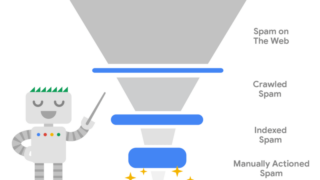Google detected 40 billion pages of spam every day in 2020, which is up from the previous year by 60%. These 40 billion pages included hacked sites, deceptively created sites, and other forms of web spam, scams and fraud. Google announced its new webspam report for 2020 that can be accessed here.
AI helps. Google has credited advancements in AI with having reduced sites with auto-generated and scraped content from showing up in its search results “by more than 80% compared to a couple of years ago,” the company said. While hacked spam was “still rampant in 2020,” Google said they improved “detection capability by more than 50%” which resulted in the company removing most of hacked spam from its search results.
Google shared this cute graphic to show how it fights spam:

COVID. Google also said it focused a lot of protecting searchers from misinformation around the pandemic. They “devoted significant effort in extending protection to the billions of searches” on such important topics around COVID. They also “made significant progress in improving our coverage and protecting more users against online scams and fraud,” Google wrote. This includes Google adding the “more about this result” feature.
Ads. Google also referenced the bad ads report that was released earlier this year where the company removed 3.1 billion ads in 2020. Why not release the reports together? Well, the Google Search team is separate from the Google Ads teams and they try not to work closely together.
Why we care. Google continues to grow and searchers seem to continue to come back to Google to search for more and more queries. We, as search marketers, like it when Google does not show spammy, low quality and especially harmful sites above ours. Hopefully, these efforts by Google help your legitimate sites rank better and also keep us safe searching.
The post Google webspam report: 60% increase in spam detection appeared first on Search Engine Land.



